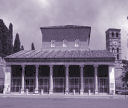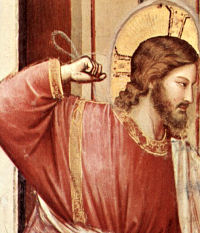» Enjoy our Liturgical Seasons series of e-books!
Communion Antiphon, Jn 4:13-14:
For anyone who drink it, says the Lord, the water I shall give will become in him a spring welling up to eternal life.
"Sir," the man replied "leave it one more year and give me time to dig round it and manure it: it may bear fruit next year; if not, then you can cut it down." (Lk. 13:9) "In the Christian life, faith has consequences, that to 'serve God' we must renounce 'Mammon,' that to be free for God we must break the hold that the world has on us. Faith demands a reconstruction of the inner life, a reforming that can be brought about only by overcoming. —The Conversion of Augustine, Romano Guardini
The Church begins the second phase of Lent—an extended meditation on Baptism—with one of the key gospel passages that were taught to the catechumens of the early Church as they prepared to receive the sacraments of initiation at the Easter Vigil: Baptism, Confirmation and the Eucharist. Today’s story of Jesus and the Samaritan woman, the longest dialogue in the four gospels, is such an important moment in the Forty Days that, although other gospel passages are appointed for this Sunday in years B and C of the Lectionary cycle, the Church asks that, in those years, this Gospel of “living water” be read on one weekday of the following week. Those who will be called to renew their baptismal promises at the Easter Vigil, as well as those being baptized or received into the full communion of the Catholic Church , are being addressed by the Lord in a special way today through his dialogue with the foreigner from whom he asks a drink of water: a conversation that teaches the entire Church something very important about prayer.
—George Weigel, Roman Pilgrimage: the Station Churches
Sunday Mass Readings for Year C:
The First Reading is taken from the book of Exodus, 3:1-8, 13-15. The story of the salvation of God's people continues during this Lenten season. Today we hear of Moses' encounter with God at the burning bush.
The Second Reading is from the first letter of Paul to the Corinthians, 10:1-6, 10-12. St. Paul establishes a parallel between the situation of the Israelites in the desert and the Corinthians. "Paul wants to remind us that we are not saved merely because we happen to have been the recipients of God's free grace. We have to demonstrate that we are willing recipients of that free gift. The children of Israel received it, but they proved to be unworthy of it, and so they were not saved." (Origin (ca. A.D. 240, Commentary on First Corinthians 4, 45, 205)
The Gospel is from St. Luke, 13:1-9. Our Lord stresses that we need to produce plenty of fruit (cf. Lk 8:11-15) in keeping with the graces we have received (cf. Lk 12:48). But he also tells us that God waits patiently for this fruit to appear; he does not want the death of the sinner; he wants him to be converted and to live (Ezek 33:11) and, as St Peter teaches, he is "forebearing towards you, not wishing that any should perish, but that all should reach repentance" (2 Pet 3:9). But God's clemency should not lead us to neglect our duties and become lazy and comfort-seeking, living sterile lives. He is merciful, but he is also just and he will punish failure to respond to his grace.
"There is one case that we should be especially sorry about — that of Christians who could do more and don't; Christians who could live all the consequences of their vocation as children of God, but refuse to do so through lack of generosity. We are partly to blame, for the grace of faith has not been given us to hide but to share with others (cf. Mt 5:151). We cannot forget that the happiness of these people, in this life and in the next, is at stake. The Christian life is a divine wonder with immediate promises of satisfaction and serenity — but on condition that we know how to recognize the gift of God (cf. Jn 4:10) and be generous, not counting the cost" (J. Escriva, Christ is passing by, 147).
—The Navarre Bible, St. Luke
Things to Do:
- Truly observe this Sunday in Lent with your family — Make it relaxing as befits the Lord's Day. Remember that the Sundays of Lent are not counted in the total forty days of this holy season, so you are not expected to continue your penances and fasting on this day. Reread the Gospel together and discuss it as a family, play games, cook a nice meal. We especially recommend the Late Spring Special Menu, with chicken stew and dumplings as the main dish, or the Spring, Fall, or Winter Sunday Dinner Menu, with the "best-ever meat loaf!"
- Read this document by our Holy Father, On Keeping the Lord's Day Holy.
- Begin to pray the Prayer for the Third Week of Lent with your family.

Third Sunday of Lent
Station with San Lorenzo fuori le Mura (St. Lawrence Outside the Walls):
The Station is in the basilica of St. Lawrence outside the walls—the walls being the old walls that marked the boundary and protected Rome. The name of this, the most celebrated of the martyrs of Rome, would remind the catechumens that the faith they were about to profess would require them to be ready for many sacrifices. In the primitive Church, the third Sunday in Lent was called Scrutiny Sunday, because it was on this day that they began to examine the catechumens, who were to be admitted to Baptism on Easter night.
For further information on the Station Churches, see The Stational Church.

Third Sunday of Lent
Station with San Lorenzo fuori le Mura (St. Lawrence Outside the Walls):
The Station is in the basilica of St. Lawrence outside the walls--the walls being the old walls that marked the boundary and protected Rome. The name of this, the most celebrated of the martyrs of Rome, would remind the catechumens that the faith they were about to profess would require them to be ready for many sacrifices. In the primitive Church, the third Sunday in Lent was called Scrutiny Sunday, because it was on this day that they began to examine the catechumens, who were to be admitted to Baptism on Easter night.
For more on San Lorenzo fuori le Mura, see:
For further information on the Station Churches, see The Stational Church.








